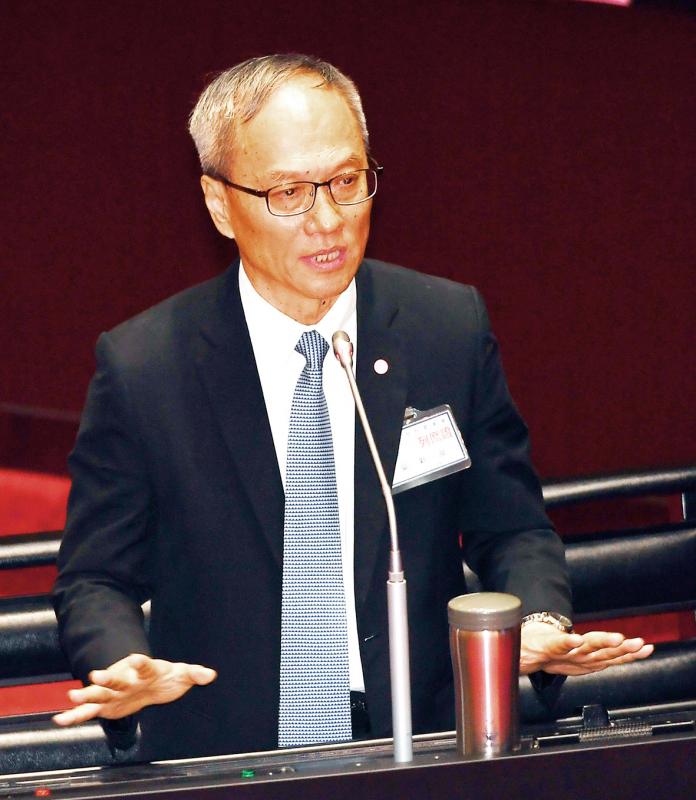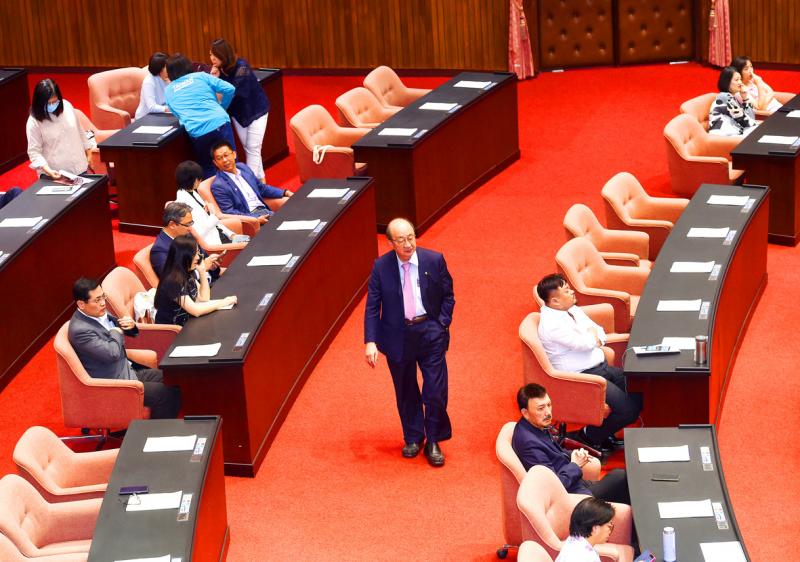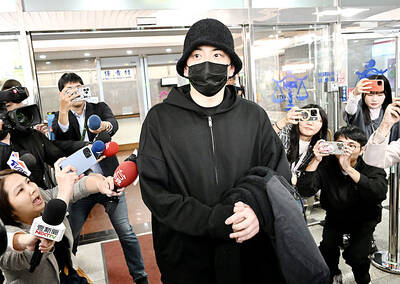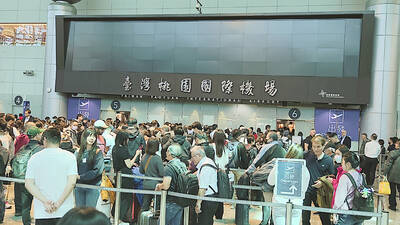Examination Yuan member nominee Wu Hsin-hsing (吳新興) yesterday faced tough questions from Chinese Nationalist Party (KMT) lawmakers about his position on the so-called “1992 consensus,” even as the party itself appears to be split over the issue.
The Legislative Yuan has been reviewing the Presidential Office’s proposed nominees for the Examination Yuan, including Wu, 68, a former Overseas Community Affairs Council minister.
Citing Wu’s published works, KMT Legislator Charles Chen (陳以信) said that the nominee appeared to support the “1992 consensus” before he worked for the government and could even be said to be a pro-unification advocate.

Photo: CNA
The “1992 consensus” — a term that former Mainland Affairs Council chairman Su Chi (蘇起) in 2006 admitted making up in 2000 — refers to a tacit understanding between the KMT and the Chinese Communist Party (CCP) that both sides of the Taiwan Strait acknowledge that there is “one China,” with each side having its own interpretation of what “China” means.
Wu said his comments on the so-called “consensus” were made during the period when Lee Teng-hui (李登輝) was president and that they were very objective, as the phrase did not exist during Lee’s time.
Addressing his works, Wu said that an academic must be inclusive and consider all views when making an analysis.

Photo: Fang Pin-chao, Taipei Times
Wu added that Lee had proposed to China that two sides of the Taiwan Strait could form a “Chunghwa Union” or “Chunghwa Commonwealth,” a proposition that Beijing rejected.
Wu said that he has been consistent in his opposition to the CCP and his support for Taiwanese sovereignty, democracy and freedom.
When asked by KMT Legislator Lee De-wei (李德維) how he intended to stay neutral when he is the only nominee affiliated with a party, Wu, a Democratic Progressive Party member, said that he would abide by all regulations.
The KMT itself appears to be split over the “1992 consensus,” which is widely seen as the party’s lynchpin for cross-strait affairs.
KMT Chairman Johnny Chiang (江啟臣) has been vocal about wanting to set aside the “consensus,” but his comments have stirred waves within the party and upset the old guard, including former party chairmen Ma Ying-jeou (馬英九), Lien Chan (連戰), Wu Den-yih (吳敦義) and Wu Po-hsiung (吳伯雄).
On Sunday, while attending an event by the party’s Institute of Revolutionary Practice, Ma said that one should first propose a viable alternative to the “consensus.”
If Beijing wished to cement the “consensus” as the guiding principle for cross-strait relations, it must adhere to the entirety of the concept and allow for different interpretations of “one China” by the two sides of the Strait, Ma said.
Beijing’s skewing of the concept has lent credence to President Tsai Ing-wen’s (蔡英文) claim that the “consensus” is the equivalent of “one country, two systems,” Ma said, adding that the KMT must clarify that the two concepts are different.
Both the ruling and opposition parties should consider a term that could replace the “1992 consensus” while remaining palatable to Beijing, former legislative speaker Wang Jin-pyng (王金平) said.
Wang downplayed reports of a KMT split over the issue, saying that people have their own views on issues and their expressions of them should not be taken as infighting.
Additional reporting by CNA

The National Immigration Agency (NIA) said yesterday that it will revoke the dependent-based residence permit of a Chinese social media influencer who reportedly “openly advocated for [China’s] unification through military force” with Taiwan. The Chinese national, identified by her surname Liu (劉), will have her residence permit revoked in accordance with Article 14 of the “Measures for the permission of family- based residence, long-term residence and settlement of people from the Mainland Area in the Taiwan Area,” the NIA said in a news release. The agency explained it received reports that Liu made “unifying Taiwan through military force” statements on her online

A magnitude 5.7 earthquake struck off Taitung County at 1:09pm today, the Central Weather Administration (CWA) said. The hypocenter was 53km northeast of Taitung County Hall at a depth of 12.5km, CWA data showed. The intensity of the quake, which gauges the actual effect of a seismic event, measured 4 in Taitung County and Hualien County on Taiwan's seven-tier intensity scale, the data showed. The quake had an intensity of 3 in Nantou County, Chiayi County, Yunlin County, Kaohsiung and Tainan, the data showed. There were no immediate reports of damage following the quake.

Actor Darren Wang (王大陸) is to begin his one-year alternative military service tomorrow amid ongoing legal issues, the Ministry of the Interior said yesterday. Wang, who last month was released on bail of NT$150,000 (US$4,561) as he faces charges of allegedly attempting to evade military service and forging documents, has been ordered to report to Taipei Railway Station at 9am tomorrow, the Alternative Military Service Training and Management Center said. The 33-year-old would join about 1,300 other conscripts in the 263rd cohort of general alternative service for training at the Chenggong Ling camp in Taichung, a center official told reporters. Wang would first

MINOR DISRUPTION: The outage affected check-in and security screening, while passport control was done manually and runway operations continued unaffected The main departure hall and other parts of Terminal 2 at Taiwan Taoyuan International Airport lost power on Tuesday, causing confusion among passengers before electricity was fully restored more than an hour later. The outage, the cause of which is still being investigated, began at about midday and affected parts of Terminal 2, including the check-in gates, the security screening area and some duty-free shops. Parts of the terminal immediately activated backup power sources, while others remained dark until power was restored in some of the affected areas starting at 12:23pm. Power was fully restored at 1:13pm. Taoyuan International Airport Corp said in a